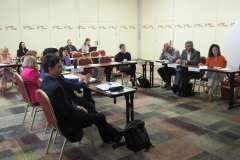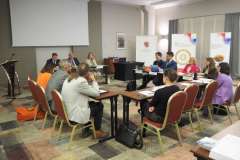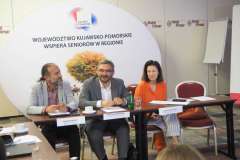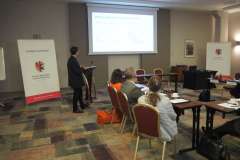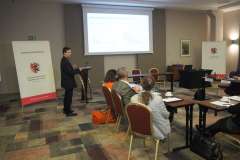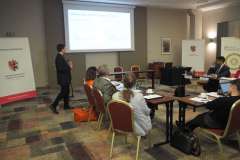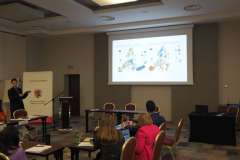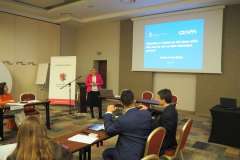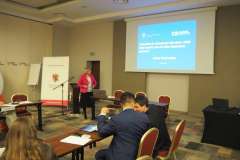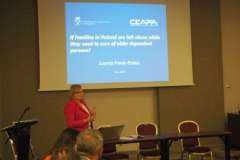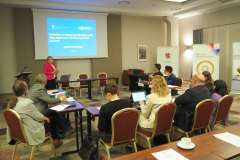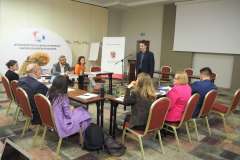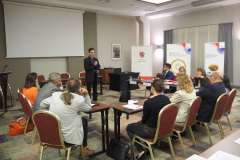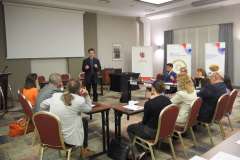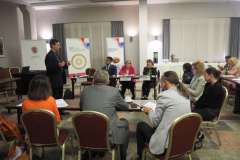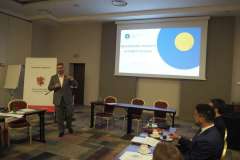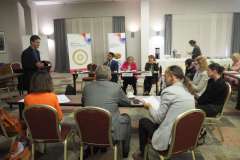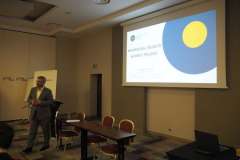

Expert Group Meeting on
Population ageing and family well-being
in Europe
in Preparation for the 30th Anniversary of the International Year of the Family
Torun (Poland), 29-30 May 2023
in Europe
In accordance with United Nations General Assembly resolutions, the preparations for the thirtieth anniversary of the International Year of the Family have been focusing on the analysis of megatrends and their impact on families. Among the megatrends, demographic shifts seem to be the best framework to focus on when referring to the European region and its ageing population. The ageing of Europe, also known as the greying of Europe, is a demographic phenomenon in Europe characterized by a decrease in fertility, a decrease in mortality rate, and a higher life expectancy among European populations.
To be better prepared for the economic and social shifts associated with an ageing population is essential to secure progress towards the achievement of the goals outlined in the 2030 Agenda for Sustainable Development. In order to ensure that progress, various sources point to the family unit and every family-friendly policy supporting the role of its members to better respond to challenges posed by ageing. Trends in population ageing are particularly relevant for those related to the care of older persons, eradicating poverty, ensuring healthy lives and well-being at all ages, promoting gender equality and full and productive employment and decent work for all, reducing inequalities between and within countries, and making cities and human settlements inclusive, safe, resilient and sustainable.
In 1994, the Programme of Action adopted at the International Conference on Population and Development in Cairo recognized population ageing as an irreversible trend and called on Governments and other stakeholders to take advantage of the associated opportunities by helping older people to maintain their economic and social independence, and by providing health care and support through family and other formal and informal safety nets. The family unit and its members are to be supported by policymakers, academics and civil society in designing, implementing and evaluating social policies to better tackle the impact of care necessities in ageing populations. Policymakers should consider how this issue affects the family. What is expected from the family? What is expected from the Governments? What family-oriented and holistic policies could be useful here?
Purpose of the meeting
The meeting aims to bring together experts to discuss and explore the issues noted above. Discussions and all documentation will be in English.
Every expert is asked to deliver a 15-minute presentation during the meeting and to prepare a short analytical paper (5 to 7 pages) on the topic of their presentation beforehand.
The primary objective of the meeting is to bring together experts to discuss and explore the issues noted above. It is organized as part of the preparations for the thirtieth anniversary of the International Year of the Family, 2024 (IYF+30). The conclusions and recommendations will inform the annual report of the UN Secretary-General on the preparations and celebration of the anniversary and support to Member States.
The conclusions and recommendations that emerge from the meeting will inform the annual report of the UN Secretary-General on the preparations for and celebration of the 30th anniversary of the International Year of the Family. The meeting will take place at Regional Center for Social Policy in Torun, Poland. The meeting discussions and all documentation will be in English.
Session 1. Families and ageing in Europe
Europe was the first region to enter the demographic transition, having begun the shift to lower fertility and increasing longevity by the late nineteenth or early twentieth centuries in almost all areas. As a result, today’s European population is the most aged of the six regions. The future population size and age-sex structure of any country depend not only on fertility and mortality, but also on international migration. As no policies to increase the mortality of a population are socially acceptable, there are, in theory, two possible ways of retarding or reversing demographic ageing. First, a reversal of declines in fertility would lead the age structure of the population back towards a younger one, thus slowing down the ageing process. However, the recent experience of low-fertility countries suggests that there is no reason to assume that their fertility will return anytime soon to the above-replacement level. Hence, as a second option, the potential role that international migration could play in offsetting population decline and population ageing has been considered. Given the possibility of attracting a larger number of immigrants into economically affluent developed countries, virtually all of which are experiencing low fertility, it appears appropriate to consider the impact that international migration may have on the demographic challenges of ageing.
Population ageing needs to be widely understood as more than just a set of discrete concerns mainly for one group of people who have advanced beyond a given age. Ageing touches all parts of economies and societies, from health care and education to employment and taxation. Each stage of life can contribute to or detract from well-being at older ages. Consumption and production patterns change as people age, and older people make important economic and social contributions at all stages of the demographic transition. Many continue paid employment while facing age-based discrimination in the labor market and encounter obstacles that limit their contributions undercutting their full participation in the economy. Postponing critical measures that allow societies to benefit from and adapt to population ageing would impose high social, economic, fiscal and health-related costs, for both current and future generations. By contrast, with appropriate foresight and planning, Governments can manage the challenges of population ageing while enhancing opportunities for all people to thrive and ensuring that no one is left behind.
Within families, older people often provide financial support to other family members or assistance with childcare. Standard demographic indicators – such as the old age dependency ratio – do not account for these factors, however. At the same time, family members care for older persons at home or indirectly through generational transfers of time, wealth or attention. Policies focusing on the provision of care for older persons should focus on supporting family care. Furthermore, evaluation and consultations have to be made to consider what is the preference and necessities of care for older persons, either institutionalized or family-based.
Questions:
How to provide assistance, care and protection for all family members, taking into account longer life expectancy, growing numbers of dual-worker households, declining fertility, higher rates of family breakdown and changing family patterns, particularly through the evaluation and development of the healthcare, pension systems and care policies? What are the potential implications of aging for the scale of migration? Since people are most likely to migrate when they are young, will an increasing share of older-age individuals in the population lead to a decrease in migration?
Session 2. Families, ageing, poverty and work-family balance (SDG 1)
Over the last ten years, the indicator of at-risk-of-poverty for the elderly has decreased by almost eight percentage points, from 25.5 to 17.7 percent. The decrease in the poverty rate was especially strong in the new member states of the European Union. There is also a strong positive relationship between the monetary poverty risk and material deprivation.
In 2021, fertility hovered below the replacement level in 124 of 236 countries or areas. Among these, 47 had fertility below 1.5 births per woman. Government policies and institutional settings, as well as associated cultural, economic and sociopolitical structures and histories, can cause fertility to decline to low levels.
Influential factors include the incompatibility between professional careers and family life, which has been identified as a major driver of low fertility. Other factors encompass the flexibility of the labor market, the educational system, gender equity, the links between marriage and childbearing, governmental subsidies for the costs of childrearing, the housing market and international migration.
A wide range of family policies can help parents balance their work and family life. Examples include employment-related support, such as parental leave for one or both parents and flexible working hours; monetary support, such as tax credits, child and family allowances, baby bonuses and childcare subsidies; and service provisions, such as childcare and after-school programmes. Some high-income countries have adopted explicit policies to influence the fertility level through economic or social incentives and tax credits.
Questions:
How to better recognize, protect and value the socio-economic contribution of unpaid care and domestic work, considering its financial, societal and cultural aspects and ensuring the transfer of cultural and ethical values between generations?
Session 3. Families, ageing and health (SDG 3)
Health trends among elderly people are complex. In some countries, there is less severe disability than in the past, but generally an increase in mild disability and functional impairment can be observed.
There is limited ability to treat effectively one of the most disabling common disorders, cognitive decline, and the accumulating burden of disease due to the obesity epidemic. The ability of older people to remain healthy and independent requires the provision of a supportive environment, including well-designed living conditions, access to economic resources, and appropriate health care. Health and social policies will thus need to deliver appropriate systems to respond to the needs of ageing populations. Given the important long-term implications, this remains relevant even in the current period of financial and economic turbulence.
In any case, an active and healthy life remains one of the major aspirations in countries around the world. This aspiration is particularly critical in making the public welfare systems sustainable, but it is also a strong prerequisite for the well-being of people. For Europeans, a healthy and active life during later life is no longer an idea but already a reality for many and a genuine possibility for others. This triumph has become possible entirely because people in European countries now have a life expectancy among the highest in the world and a large part of longer lives is spent in good health.
The challenge is therefore to identify strategies that are effective in promoting and sustaining activity, independence and health during older ages, with the help of top-down public policies at the national and local level, by initiatives from civil society organizations as well as by bottom-up behavioral responses by older people themselves.
For these purposes, the major policy strategy that has emerged over the past two decades is referred to as active ageing. The active ageing policy discourse links specifically with the social ageing phenomenon in which, with rising life expectancy on average, it is important to realize the full potential of older people. It is predicated on the insight that, in tackling issues associated with population ageing, the successful measures are those that set in place the conditions to empower people to live active and healthy lives throughout their lives.
What has also become clear is the necessity for a high-quality and independent evidence base that will help address how experiences of ageing at the individual level can be combined with higher levels of public policies, improving health and a greater degree of autonomy and self-reliance.
Questions:
How to foster healthy and active ageing, promote intergenerational solidarity and meet the needs of the elderly in vulnerable situations. How to put in place quality and affordable community-based and institutional care services when the family cannot supply it. What is the importance of the role of grandparents in the family and the value of older persons for the whole society.
Session 4. Families, ageing and education (SDG 4)
The main challenges for lifelong learning in ageing societies in Europe have to take into account an urgent need to increase the availability of vocational training in the workplace, particularly about digitalization and new technologies, to enable older workers to remain active in the workforce. Access to information is increasingly available only using online services, and so training in digital skills is important to ensure that older adults can have access to their rights.
Lifelong learning in health domains during retirement is also an important element in the prevention of the loss of autonomy. Acquiring skills in digital technologies can help older people to maintain an active and healthy lifestyle and lessen the risk of social isolation. When older adults permanently leave the labor market or are not engaged in paid labor, lifelong learning has a central role in promoting well-being and good quality of life in old age. The chapter concludes that, although some practical and effective measures to include lifelong learning activities that address the needs of ageing societies have been put in place, there is a growing need throughout Europe to focus on promoting lifelong learning in local and community settings and for all age groups.
The challenges of population ageing have often been presented in a way that portrays old age as a problematic stage of the life course. Such negative representations of later life and old age undermine the significant contribution that older people can make to society, because there is also an increase in the opportunities for lifelong learning in older sectors of the population is to be welcomed. At the same time, it is important to take into account the fact that many older people are either unaware of the existence of lifelong learning activities or are unable to access and participate in them.
The reasons for the barriers to lifelong learning among older adults are not essentially different from those for younger age groups. Some have identified three categories of barriers: attitudinal barriers, including negative attitudes to learning, a lack of confidence or a lack of motivation; material and physical barriers, which include the costs of learning as well as time factors, such as family care responsibilities, and structural barriers, which relate to a lack of appropriate education or training opportunities at the local level and the unavailability of work-related training. A key question for ageing societies is, therefore, how to harness the potential of older people to engage in lifelong learning activities.
As the age structure of immigrants is often younger than that of the host population, there is a popular belief that a large influx of immigrants makes the population of the host country significantly younger. Accordingly, it is commonly believed that a more generous immigration policy can immediately increase the number in the working-age population and help reduce markedly the dependency costs of the elderly. However, the analyses of migration flows in recent decades in developed countries provided scant evidence to support these conclusions.
The policy conclusion drawn concerning a possible “demographic need” for migrants in Europe changes markedly when different sources of population heterogeneity and associated dependency burdens are considered. The conventional way of only considering the changing age composition of the population has served as the foundation for the widely discussed United Nations study on “Replacement Migration”, which concluded that migration can help avoid population decline but that stop the increase of the total age-dependency ratio would require implausibly high volumes of immigrants and would therefore be unrealistic. Here we show that when adding labor force participation and education as additional demographic characteristics to the analysis, the projected dependency ratios will increase much less than previously expected under baseline trend assumptions.
Questions:
What are the main challenges to quality education in Europe? How can intergenerational solidarity help it? How can parenting education be improved? Since people are most likely to migrate when they are young, will an increasing share of older-age individuals in the population lead to a decrease in migration?
Session 5. Families, ageing, equality and care (SDG 5)
Poverty levels at older ages are typically higher among women. Lower levels of participation in formal labor markets, shorter working careers and lower wages compared to men leave many women struggling with greater economic insecurity later in life. Given women’s longer life expectancies, older women are more likely than older men to be widowed, less likely to remarry and more likely to live alone – three features that can exacerbate economic insecurity.
Women also bear the brunt of deficiencies in caregiving. The unequal distribution of care and domestic work within families curtails women’s working lives and constricts pension incomes. In the labor market, women make up most caregivers, working in both the informal and formal sectors of a poorly regulated care economy where workers typically earn low wages. At the end of their lives, older women are more likely to need long-term care because they live longer and are at greater risk of age-related disabilities than their male counterparts.
Mainstreaming ageing and mainstreaming gender are interlinked. Gender inequalities in older age result from accumulated gendered disadvantages during the life course. The need to adopt a life course approach when dealing with the interconnections of ageing and gender arises from the understanding that the present circumstances of older people can be understood by references to their prior life course. This requires the linking of socioeconomic position, roles and relationships in later life to the earlier biographies of men and women. In many countries, gender mainstreaming is an established concept; others are embarking on national strategies to eradicate gender inequality in all generations.
Gender equality requires rebalancing care duties within families and adopting family and labor policies that enable women and men to manage both domestic responsibilities and market employment. Such changes will foster women’s labor force participation, strengthening the productive capacity of economies as populations grow older. Yet increased participation in the labor market will not be sufficient on its own. Substantial improvement in women’s economic security throughout the life course, including at older ages, depends on eliminating gender disparities in education and ensuring access to decent work for both women and men. Bringing care work more consistently into the formal economy would create decent jobs and expand employment opportunities for women. It will also help to protect women when they grow old by the provision of care guidelines supporting family and/or institutionalized based care. Within the context of ongoing and future uneven global population ageing, old age discrimination – ageism can, in several ways, impact social cohesion, health and well-being of European societies. However, the research on perceived discrimination based on three different domains has shown that the traditional East-West gap does not appear in this context.
Questions:
How can the burden of care for women be compensated? How can age discrimination be faced, as it isn’t specifically listed in human rights instruments, unlike sex, gender or race?
Bibliography
- UN DESA, ‘Leaving No One Behind in an Ageing orld – World Social Report 2023’. UN DESA, Population Facts, ‘Population Ageing and Sustainable Development’ (2017).
- Bernhard Ebbinghaus, ‘Inequalities and poverty risks in old age across Europe: The double-edged income effect of pension systems’ (2020).
ESPON 2020 Monitoring Committee, ‘The ageing revolution: towards a European Silver Deal?’ (2021). - Euractiv, ‘Golden years: Opportunities for Europe’s ageing population’ (2022).
- European Centre for Social Welfare Policy and Research, ‘Measuring active and healthy ageing in Europe’ (2017).
- Guillaume Maroisa, Alain Bélanger and Wolfgang Lutz, ‘Population ageing, migration, and productivity in Europe’ (2019).
- Population and Economics, ‘Perception of population ageing and age discrimination across EU countries’ (2019).
- Radoslaw Antczak and Asghar Zaidi, ‘Risk of Poverty among Older People in EU Countries’ (2016).
- UNECE, ‘Gender equality, work and old age’ (2009).
- UNESCO, ‘Lifelong learning in ageing societies: Lessons from Europe’ (2021).
- World Health Organization, ‘How can health systems respond to population ageing?‘ (2009).
- Zbigniew Długosz, ‘Population ageing in Europe’ (2011).
Experts
Thomas Fent
Thomas Fent is a population economist at the Wittgenstein Centre for Demography and Global Human Capital, a joint research collaboration between the International Institute for Applied Systems Analysis in Laxenburg, the Vienna Institute of Demography of the Austrian Academy of Sciences, and the University of Vienna. He conducts research in various fields of demography with a focus on the impact of social effects on demographic behavior. His areas of expertise include Social Interactions & Demographic Behaviour, Fertility, Family Dynamics, and Family Policies, Economics of Ageing, Ageing and Human Capital and Agent-based Models.
Jolanta Perek-Białas
Jolanta Perek-Białas is an Associate Professor at the Institute of Sociology of the Jagiellonian University in Cracow in Poland. She is the Director of the Center for Evaluation and Public Policies Analysis, as well as a researcher at the Institute of Statistics and Demography at the Warsaw School of Economics. Her research interest focuses on the socioeconomic situation of older persons in Central and Eastern Europe, including active ageing, ageism in the labor market policy, social exclusion of older persons and care for older persons, with many publications on these topics.
Jarosław Przeperski
Jarosław Przeperski is the Head of the Center for Family Research at the Nicolaus Copernicus University in Toruń, and an assistant professor in the Social Work Department. His research interests focus on behavioral sciences, studies of family transitions and risks, family policies and demographic processes. He is the author of several publications in international scientific journals and has edited books and book series for Oxford University Press, Routledge and Springer. He has also worked as an expert and principal researcher on projects for the Ministry of Family, Labour and Social Policy, the Ministry of Justice, the Presidential Chancellery and the Children’s Ombudsman in Poland.
Rosalind Willi
Rosalind Willi holds two Master’s Degrees from the University of Vienna and is Research and Learning Advisor at SOS Children’s Villages International, an international child-focused organization active in more than 136 countries and territories worldwide. She is currently finalising her PhD research at the Institute of Development Studies (Brighton, UK), focusing on child and family wellbeing and family support services in a displacement context, using participatory, visual and ethnographic methodologies. In her role at SOS Children’s Villages she regularly develops briefing papers and evidence-based publications related to family support and alternative care services and acts as an advisor to Member Associations on research processes across the organisation.
András Székely
András Székely is Director of the Vékenen Health Psychology Foundation (Hungary) and Head of Policy Analysis at the Maria Kopp Institute for Demography and Families (KINCS). He has been a senior researcher at the Semmelweis University medical school in Budapest and has authored numerous studies on mental health and families.
Elena Curtopassi
Elena Curtopassi is the secretary general of the European Local Inclusion and Social Action Network, set up in 2008 at the Committee of the Regions in Brussels as a joint project of municipalities and public institutions from 8 member states of the EU. She is responsible for social policy at the Veneto Regional Office in Brussels and a member of the Covenant on Demographic Change, an organization aiming to mobilize stakeholders across Europe on active and healthy aging and to create tools for the participation of elderly and elderly citizens in initiatives for the elderly. She coordinates and participates in many European programs such as Erasmus +, Horizon 2020, Health, etc.
Mélissa-Asli Petit
Mélissa-Asli Petit has a Ph.D. in Sociological Demography from the Université Paris Cité with ‘Mention Trés Honorable’ and is a specialist in seniors and the challenges of aging, She founded and has been running Mixing Générations since 2015, a French think tank on longevity and silver economy. Its goal is to break age stereotypes and foster solidarity among ages, genders and cultures.
Irma Rognoni
Irma Rognoni holds a law degree from the University of Barcelona and the University of the Balearic Islandsand a master in Mediation and Alternative Conflict Resolution from Ramon Llull University. Member of the Human Rights Institute. She’s a practicing lawyer, experienced in Family Law, Minors and Patients, as well as Entity Law and Human Rights. She was a member of the municipal government of Barcelona (Spain) from 2011 to 2014, in charge of Family, Childhood, Use of Time and Disabilities. She currently works as a national and international mediator and consultant in conflict resolution in the family, organizational, community and international spheres. She has also participated as a technical adviser in the elaboration of the Government program on Children’s matters of the Health Minister of the Catalan Government.
Linda Kridahl
Linda Kridahl has a Ph.D. in Sociological Demography from the Department of Sociology at Stockholm University. Currently, she studies older couples focusing on economic conflicts, household money management, relational satisfaction, and gender equality. She is the former President of the Swedish Demographic Association and has received a 4.8 million grant from Forte to study late-life divorce together with other colleagues.
Ignacio Socias
Ignacio Socias is the Director of International Relations of the International Federation for Family Development, an umbrella organization for more than 250 Family Enrichment Centers that operate in 70 countries. He has promoted the global project ‘SDGs and families’, with the participation of experts from five continents and the support of UNICEF and UN-DESA. In addition, he has promoted the global project ‘Inclusive Cities for Sustainable Families’. He has also represented IFFD in the European Commission project ‘FamiliesAndSocieties’ (2013-2017), the largest research carried out in Europe on family issues, and has participated in different high-level events on the family at the European Parliament, the Committee of Regions and the Economic and Social Committee. He has been visiting professor at more than a dozen Universities in Europe, America and Africa.
Papers
- Families, ageing and health by Elena Curtopassi
- Families and ageing in Europe by Thomas Fent
- Population ageing and family well-being in Europe Families, ageing, equality and care by Ignacio Socias
- Aging and lifelong learning by Mélissa-Asli PETIT
- Adapting to an Ageing Society: Meeting the Care Challenges in Poland by Jolanta Perek-Białas
- Behavioural Insights in family policy. An example of the work-family balance concept by Jarosław Przeperski
- Families, ageing and education (SDG 4) by Irma Rognoni Viader
- Strengthening care across generations: mitigating risks of family separation through recognition by Rosalind Willi









